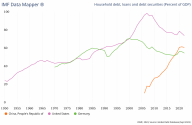One very positive aspect of the real estate routing is that household debt has stopped its explosive rise.
China (orange line in chart) saw a tremendous increase. Some amount of that was probably even healthy, as it stimulated the economy, but clearly the crisis came at the right time. Had it continued for the rest of this decade, we could have seen a 2008-style crisis that we saw in the US. Instead, it merely slowed down the Chinese economy somewhat without being a major crisis.
The recent announcements by the Chinese authorities that they intend to take over a greater share of the housing sector is welcome. I think the Singapore model works pretty well. I question how much value that companies like Evergrande ever contributed to the economy.

China (orange line in chart) saw a tremendous increase. Some amount of that was probably even healthy, as it stimulated the economy, but clearly the crisis came at the right time. Had it continued for the rest of this decade, we could have seen a 2008-style crisis that we saw in the US. Instead, it merely slowed down the Chinese economy somewhat without being a major crisis.
The recent announcements by the Chinese authorities that they intend to take over a greater share of the housing sector is welcome. I think the Singapore model works pretty well. I question how much value that companies like Evergrande ever contributed to the economy.

